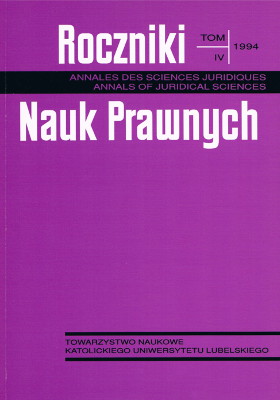Elements of Philosophy of Law in the Teaching of John Paul II
Abstract
This article is taken from a presentation given in French during the International Colloquium on the general theme of John Paul II and political society (Paris, 30 Nov − 1 Dec 1990), organized by the Institut Européen des Relations Église-État. The French text has been published as L'humanisme de Jean Paul II: Prémices d'une philosphie du droit, in Jean-Paul II et l'éthique politique, edited by Joël-Benoît d'Onorio, Paris 1992, pp. 19-43. The Italian text, from which this Polish translation was made, has been published as La filosofia del diritto di Giovanni Paolo II, in Apollinaris 64(1991) 521-548.
The philosopher Karol Wojtyła, once elected Pope, no longer presents himself as a philosopher, having become the chief teacher of the Faith in the Church and of the Church. This, however, does not prevent his own philosophical thought from underlying and being visible in his papal teaching.
In order to gather the elements of the philosophy of law in their organic unity as found in the teaching of John Paul II, the first part of the presentation offers the philosophical thought set forth by him as Karol Wojtyła in regard to: 1) man as personal subject (the subjectivity of the human person; his freedom; his self-possession and self-governance, thanks to which man determines himself; the necessity to submit his own acting to the truth about the good, which takes place in the conscience; the fulfillment of man only by means of morally good acts; the transcendence of the person in the action; the integration of the person in the action; 2) the communitarian aspect of human existence and acting, in which for Karol Wojtyła the concept of participation has crucial importance. In his philosophy this concept assumes a specific meaning in comparison with the different nuances of meaning that it has in traditional and contemporary philosophy. In this perspective, our Author distinguishes between the interpersonal dimension („I-Thou”) and the social dimension („We”) of community, strongly underlining the essentiality, the primordiality and the primacy of the interpersonal dimension, without which the existence and the acting of men „together with others” cannot be cosidered human. Participation has a normative value in which one glimpses the fundamental human. Participation has a normative value in which one glimpses the fundamental need for the commandment of love. According to Wojtyła the cocept of alienation is strictly connected with that of participation, as its negation. Our Philosopher explains all these concepts with reference to concrete situations (individualism, tatalism, solidarity, opposition, dialogue, conformism, non-involvement).
In order to demonstrate how these elements can be seen in the teaching of John Paul II, the second part of the presentation examines the following questions of the teaching of the Successor of the Apostles: 1) the dignity of the person and his integral dimension; the rights of man as fundamental principle of action for the good of man; 3) the freedom of man and the truth about the good; 4) work; 5) true progress; 6) solidarity and dialogue; 7) love; 8) the remaining questions which could be examined in this perspective.
The concluding observations principally a) present in a synthetic manner the postulates of John Paul II regarding law and b) observe that the teaching of John Paul II one can see the insufficiency of the philosophy of law and the need for the theology of law in order that law may serve man in his integral dimension. In fact, law is for man. As a consequence a true and full understanding of the human person is fundamental for the proper ordering of law. John Paul II repeats insistently that one cannot understand man in depth without Christ, that Christ is the key for understanding the reality of man. Therefore one must conclude that according to John Paul II in order for law to be able to serve man in his true and full dimension one needs the theology of law as well, that is, the consideration of divine revelation. The invitation to the theology of law can already glimpse in the inaugural address of his pontificate: „Do not be afraid to welcome Christ ... open, throw wide the doors to Christ! To his saving power open the confines of the States, economic systems as well as political, the vast areas of culture, of civilization, of development. Dop not be afraid! Christ knows what is within man. He alone knows!”
Copyright (c) 1994 Roczniki Nauk Prawnych

This work is licensed under a Creative Commons Attribution-NonCommercial-NoDerivatives 4.0 International License.


